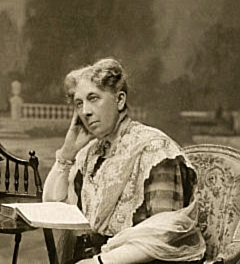The history of feminism comprises the narratives of the movements and ideologies which have aimed at equal rights for women. While feminists around the world have differed in causes, goals, and intentions depending on time, culture, and country, most Western feminist historians assert that all movements that work to obtain women's rights should be considered feminist movements, even when they did not apply the term to themselves. Some other historians limit the term "feminist" to the modern feminist movement and its progeny, and use the label "protofeminist" to describe earlier movements.

Hubertine Auclert was a leading French feminist and a campaigner for women's suffrage.

A movement to fight for women's right to vote in the United Kingdom finally succeeded through acts of Parliament in 1918 and 1928. It became a national movement in the Victorian era. Women were not explicitly banned from voting in Great Britain until the Reform Act 1832 and the Municipal Corporations Act 1835. In 1872 the fight for women's suffrage became a national movement with the formation of the National Society for Women's Suffrage and later the more influential National Union of Women's Suffrage Societies (NUWSS). As well as in England, women's suffrage movements in Wales, Scotland and other parts of the United Kingdom gained momentum. The movements shifted sentiments in favour of woman suffrage by 1906. It was at this point that the militant campaign began with the formation of the Women's Social and Political Union (WSPU).
Social feminism is a feminist movement that advocates for social rights and special accommodations for women. It was first used to describe members of the women's suffrage movement in the late nineteenth and early twentieth centuries who were concerned with social problems that affected women and children. They saw obtaining the vote mainly as a means to achieve their reform goals rather than a primary goal in itself. After women gained the right to vote, social feminism continued in the form of labor feminists who advocated for protectionist legislation and special benefits for women. The term is widely used, although some historians have questioned its validity.

Marguerite de Witt-Schlumberger was a French campaigner for pronatalism, alcoholic abstinence, and feminism. She was the president of the French Union for Women's Suffrage movement. She married into the Schlumberger family and became a powerfully influential matriarch and the mother of several sons who achieved notability in their own right. An activist in international women's rights circles, Witt-Schlumberger was a leading suffragist at the Paris Peace Conference in 1919. For her active involvement and service to the government, she was awarded the Croix of the French Legion of Honour in 1920.

Eliska Vincent was a Utopian socialist and militant feminist in France. She argued that women had lost civil rights that existed in the Middle Ages, and these should be restored. In the late 1880s and 1890s she was one of the most influential of the Parisian feminists. She created extensive archives on the feminist movement of the 19th and early 20th centuries, but these have been lost.

Caroline de Barrau (1828–88) was a wealthy French educationalist, feminist, author and philanthropist. She became interested in the education of girls, created a school in Paris where her daughter was taught, and encouraged her daughter and other young women to successfully apply for admission to the University of Paris, previously a male-only institution. She belonged to international feminist associations, investigated the conditions of working women in Paris, was a leader in the campaign to eliminate state-regulated prostitution, helped prostitutes reenter society after being released from prison and provided aid to abandoned infants. She was the author of several books on women's issues.

Marthe Bigot (1878–1962) was a French primary schoolteacher, feminist, pacifist and communist.

Léon-Pierre Richer was a French free-thinker, freemason, journalist and feminist who worked closely with Maria Deraismes during the early years of the feminist movement in Paris. He edited Le Droit des femmes, a feminist journal that appeared from 1869 to 1891. He was founder of the Ligue française pour le droit des femmes, one of the main feminist organizations in France in the 1880s. However, Richer was concerned that women were not sufficiently educated in republican principles, and that giving them the vote could cause a clericalist and monarchist reaction and the loss of democracy.

Marianne Rauze was a French journalist, feminist, socialist, pacifist and communist.

The National Council of French Women is a society formed in 1901 to promote women's rights. The first members were mainly prosperous women who believed in using non-violent means to obtain rights by presenting the justice of the cause. Issues in the first half century included the right to vote, legal equality between husband and wife, paternal child support, social support for children, equal employment opportunity, equal pay for equal work and acquisition of citizenship on marriage. The National Council of French Women is affiliated with the International Council of Women (ICW). Now the oldest of French feminist organizations, it continues to work for causes related to the rights of women.

Marguerite Pichon-Landry (1877–1972) was a French feminist who was president of the National Council of French Women from 1932 to 1952.

Suzanne Grinberg was a pioneering French lawyer, feminist and pacifist. She was one of the women who participated in the Inter-Allied Women's Conference which opened in Paris in February 1919. In 1920, she was vice-president of the Association du Jeune Barreau and secretary of the central committee of the French Union for Women's Suffrage. Her contemporaries in the committee include Pauline Rebour and Marcelle Kraemer-Bach. In one of her arguments for women's suffrage, she argued that, in France, women were forced to choose between love for their homelands and their love for their husbands. She later published an account of the French suffragist movement (1926) as well as two works on women's rights.
Thérèse Léa Maryvonne Gabrielle Alphen-Salvador (1856–1920) was a French philanthropist, feminist suffragist and pacifist. From the 1890s she was active in the women's movement, becoming one of the founders of the National Council of French Women in 1901 and later participating in the French Union for Women's Suffrage (Union française pour le suffrage des femmes). She is remembered above all for helping to establish the École professionnelle d'assistance aux malades, France's first school for nurses. As the institution's president from 1900 to 1920, she was instrumental in its further development.

Léonie Rouzade, born Louise-Léonie Camusat (1839–1916) was a French feminist, politician, journalist and author. An active supporter of women's rights, in 1880 together with Eugénie Pierre, she founded the Union des femmes, the first socialist women's association in France. As a writer, in 1872 she published two novels: Le Monde renversé and Voyage de Théodose à l'île de l'Utopie.
Dorothy Helen Cornish was an English Montessori educator, suffragist, translator, writer and editor of the feminist gender studies journal Urania.

Céleste Hardouin (1832-1904) was a school teacher who advocated for lay education for women.

La Française, subtitled Journal de progrès féminin, was a French language reformist feminist weekly newspaper published in France. It was founded in 1906 by feminist Jane Misme, who ran it until 1926, when Cécile Brunschvicg, the future under-secretary of state under the Popular Front, took over. The title was published until 1940. This weekly gave a national audience to the cause of women's suffrage. It even became the mouthpiece for the French Union for Women's Suffrage, founded by Jeanne Schmahl in 1909.














